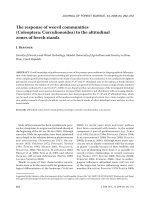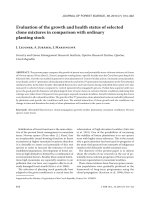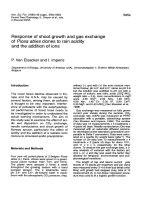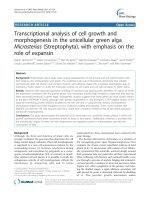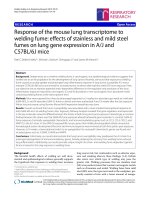Response of gladiolus growth and flowering to trichoderma and varieties
Bạn đang xem bản rút gọn của tài liệu. Xem và tải ngay bản đầy đủ của tài liệu tại đây (197.18 KB, 5 trang )
Int.J.Curr.Microbiol.App.Sci (2018) 7(7): 2568-2572
International Journal of Current Microbiology and Applied Sciences
ISSN: 2319-7706 Volume 7 Number 07 (2018)
Journal homepage:
Original Research Article
/>
Response of Gladiolus Growth and Flowering to Trichoderma and Varieties
Akash Pal, Anjana Sisodia* and Anil K. Singh
Department of Horticulture, Institute of Agricultural Sciences
Banaras Hindu University, Varanasi, U.P., India
*Corresponding author
ABSTRACT
Keywords
Gladiolus,
Cultivars,
Trichoderma,
Growth, Flowering
Article Info
Accepted:
17 June 2018
Available Online:
10 July 2018
An experiment entitled “Response of gladiolus growth, flowering and corm to
Trichoderma and varieties” was carried out at Horticulture Research Farm, Department of
Horticulture, Institute of Agricultural Sciences, Banaras Hindu University, Varanasi,
(U.P.), during 2017-2018. Experiment consisted of eight varieties of gladiolus namely
Yellow Jester, Tiger Flame, Punjab Morning, Punjab Dawn, Pusa Kiran, Shubhangini,
IIHR, and Dhanvantri and application of Trichoderma i.e. treated and control. Thus there
were sixteen treatment combinations. Experiment was laid out in Randomized Block
Design with three replications. Application of Trichoderma was found beneficial for plant
growth and flowering characters. Plant treated with Trichoderma show maximum width of
leaf and plant height at 60 days. The width of scape also influenced by Trichoderma but
there was no any significant effect of Trichoderma on width of scape. Plant treated with
Trichoderma show maximum rachis length and longevity of 5 th floret. Days to colour
show, longevity of 3rdfloret and number of open floret without withering first floret are
influenced by Trichoderma but there was no any significant influence of Trichoderma.
Among different varieties cv. Shubhangini recorded maximum width of leaf at 60 days,
whereas in cultivar Yellow Jester exhibited maximum width of scape. The maximum plant
height was recorded in cultivar Dhanvantri. The maximum longevity of 3 rd and 5th floret
was recorded in cultivar Yellow Jester and maximum number of open floret without
withering first floret recorded in cultivar Dhanvantri. However maximum rachis length and
minimum days to colour show exhibited by cv. IIHR.
Introduction
Gladiolusis a bulbous ornamental plant that
belongs to the family Iridaceae. In commercial
floriculture, bulbous ornamental crops are an
important group of plants and are considered
as the wealth of the country. Gladiolus is an
important commercial flower crop and is very
popular as cut flower both in domestic and
international
market.
Gladiolus
was
introduced into cultivation towards the end of
sixteenth century. The flowers are used in
flower arrangement, in bouquets and for
indoor decorations (Singh and Sisodia, 2017).
There are over 30,000 varieties of gladiolus.
These have mostly been evolved through
conventional breeding in USA, The
Netherlands, UK, Canada, Russia, Australia,
2568
Int.J.Curr.Microbiol.App.Sci (2018) 7(7): 2568-2572
Slovakia, Poland, Japan, New Zealand and
India whereas a few through mutation
breeding in USA, The Netherlands, Russia,
Hungary and India (Singh, 2006). All the
varieties may not perform well in a region.
Therefore, evolution of some promising
varieties for a specific region is important. To
boost up the yield potential use of bio-agents
like Trichoderma plays an important role in
enhancing the flowering and growth
parameters in gladiolus. Therefore, present
investigation has been planned to study the
response of gladiolus plant growth and
flowering attributes to Trichoderma and
varieties.
gladiolus varieties (Table 1). Width of leaf and
plant height at 60 days after planting of corms
was statistically higher with Trichoderma
treatment in comparison to control. However,
application of Trichoderma fails to exert any
conspicuous effect on width of leaf at 30 days,
width of scape at 30 and 60 days and height of
crop at 30 days. Although maximum leaf
width and plant height was noted in
Trichoderma treated plant as reported by
Dongardive et al., (2007) and Dubey et al.,
(2008). Singh and Sisodia (2015) and Singh et
al., (2016) also found beneficial effect of
Trichoderma in combination with FYM and
Vermicompost in gladiolus crop.
Materials and Methods
All the growth character influenced
significantly due to varieties of gladiolus. It is
interested to note that maximum width of leaf
at 30 days was recorded in cultivar Pusa Kiran
followed by IIHR and at 60 days cultivar
Shubhangini exhibit maximum leaf width. The
maximum width of scape at 30 days was
noticed in cultivar Yellow Jester followed by
Dhanvantri and at 60 days maximum width of
scape was recorded in cultivar Yellow Jester
followed by Shubhangini. Maximum plant
height at 30 and 60 days recorded with
cultivar Dhanvantri which was statistically
higher than other varieties. There is wide
variation in plant height among the varieties is
mainly due to genetic nature of germplasm.
Present finding are also in close conformity
with the observation made by (Singh et al.,
2013a) in tuberose, Singh and Sisodia (2015)
and Sisodia et al., (2015) in gladiolus.
The experiment was carried out at Horticulture
Research Farm of the Department of
Horticulture,
Institute
of
Agricultural
Sciences, Banaras Hindu University, Varanasi,
which is situated at 25° 02′ North latitude, 83°
03′ East longitudes and at an elevation of
128.93 meters above the sea level. Eight
varieties of gladiolus (Yellow Jester, Tiger
Flame, Punjab Morning, Punjab Dawn,
PusaKiran,
Shubhangini,
IIHR,
and
Dhanvantri) were treated with Trichoderma
and also control corms were untreated. Thus,
there were sixteen treatment combinations.
Treated and untreated corms were planted
with spacing of 30 cm between the rows and
20 cm between the plants during December
2017. The experiment was laid out in
Randomized Block Design with three
replications. Uniform cultural practices were
done for all the varieties. Observations were
recorded on various growth and flowering
parameters and data were analyzed
statistically.
Results and Discussion
Growth characters
Various growth
significantly due
parameters influenced
to Trichoderma and
Flowering parameters
Different
flowering
parameters
were
influenced significantly due to Trichoderma
and gladiolus varieties (Table 2). The plant
treated with Trichoderma exhibited maximum
longevity of 3rd floret but there was no any
significant effect, whereas the maximum
longevity of 5th floret was noticed in
Trichoderma treated plant. Trichoderma
2569
Int.J.Curr.Microbiol.App.Sci (2018) 7(7): 2568-2572
treated plant show maximum number of open
florets without withering of lower floret, but
there was no any significant effect. The rachis
length was noticed influenced significantly by
Trichoderma. However, application of
Trichoderma fail to exert any pronounced
effect on days to colour show, longevity of 3rd
floret and number of open florets without
withering of lower floret. Beneficial effect of
application of Trichoderma was also reported
by Anuje et al., (2004) and Atta-Alla et al.,
(2003).
All the flowering parameters except number of
open florets without withering of lower floret
were influenced significantly due to varieties
of gladiolus. Minimum days to colour show
was recorded in variety IIHR followed by cv.
Punjab Morning, whereas cultivar Tiger Flame
was most late to colour show. There is
variation in days to colour show among
different cultivar as reported by and Singh et
al., (2017). The maximum longevity of 3rd
floret was recorded in cultivar Yellow Jester
which was statistically at par with cvs. Tiger
Flame, Pusa Kiran and Shubhangini are
significant to all other varieties. Whereas,
cultivar Yellow Jester exhibited maximum
longevity of 5th floret followed by Tiger
Flame. The maximum number of open floret
without withering first floret was recorded in
cv. Dhanvantri followed by cv. Tiger Flame.
The maximum rachis length was noticed in
germplasm IIHR which was statistically at par
with Pusa Kiran and significant to all other
varieties. Difference on floret length was
also found in gladiolus varieties (Fig. 1).
Maximum length of 1st floret was exhibited
with cv. Dhanvantri, whereas 3rd and 5th floret
was maximum in germplasm IIHR.Variation
in floret and spike length might be due to
variation in their intrinsic factor as reported by
various previous workers (Rani and Singh
(2005), Pragya et al., (2010), Singh et al.,
(2017).
Table.1 Response of gladiolus growth to Trichoderma and varieties
Treatment
Bio-agent
Control
Trichoderma
CD at 5%
Gladiolus varieties
Yellow Jester
Tiger Flame
Punjab Morning
Punjab Dawn
Pusa Kiran
Shubhangini
IIHR
Dhanvantri
CD at 5%
Width of Width of Width
of Width
of Plant height at Plant height at
leaf at 30 leaf at 60 scape at 30 scape at 60 30 days (cm)
60 days (cm)
days (cm) days (cm) days (cm)
days (cm)
1.87
1.92
NS
2.23
2.93
0.25
1.41
1.43
NS
1.83
1.73
NS
30.94
29.03
NS
45.37
52.23
2.32
1.99
1.35
1.38
1.50
2.32
1.96
2.23
2.19
0.47
3.35
2.57
2.23
2.34
2.90
3.8
2.54
3.19
0.49
1.69
1.27
1.25
1.20
1.32
1.49
1.47
1.65
0.21
2.49
1.69
1.43
1.55
1.69
2.00
1.68
1.72
0.38
23.72
21.08
24.87
32.64
33.77
25.21
32.36
46.25
4.18
40.46
39.57
47.94
57.04
48.18
40.86
47.15
68.80
4.57
2570
Int.J.Curr.Microbiol.App.Sci (2018) 7(7): 2568-2572
Table.2 Response of gladiolus flowering to Trichoderma and varieties
Treatment
Bio-agent
Control
Trichoderma
CD at 5%
Gladiolus varieties
Yellow Jester
Tiger Flame
Punjab Morning
Punjab Dawn
Pusa Kiran
Shubhangini
IIHR
Dhanvantri
CD at 5%
Days to
colour show
Longevity of
3rd floret
Longevity
of 5th floret
No. of open
floret without
withering of
lower floret
Rachis
length (cm)
82.30
83.70
NS
4.75
4.83
NS
4.51
5.23
0.32
6.30
6.59
NS
33.68
36.81
2.13
89.27
90.20
79.77
81.83
80.11
80.79
78.49
83.61
7.81
5.72
5.10
4.48
4.72
5.04
5.02
4.97
3.30
0.77
5.91
5.37
4.73
4.83
5.13
4.86
4.90
3.57
0.63
6.41
6.83
6.29
6.11
6.33
5.85
5.97
7.78
NS
28.80
34.20
31.75
32.41
42.75
32.83
43.10
34.14
4.24
Fig.1 Length of 1st, 3rd and 5th floret
2571
Int.J.Curr.Microbiol.App.Sci (2018) 7(7): 2568-2572
References
Anuje, A.A., Dalal, S.R., Gonge, V.S. and
Deshpande, R.M. (2004). Effect of
growing media on growth, flowering
and yield of gerbera under polyhouse
conditions.
Orissa
Journal
of
Horticulture, 32 (2): 106-108.
Atta-Alla, H.K., Zaghloul, M.A., Barka, M.
and Hashish, K.H. (2003). Effect of
organic manure and NPK fertilizers on
the vegetative growth, flowering and
chemical composition of some
gladiolus
cultivars.
Annals
of
Agricultural Science, Moshtohor,
41(2): 889-912.
Dongardive, S.B. Golliwar, V.J. and Bhongle,
S.A. (2007). Effect of organic manure
and biofertilizers on growth and
flowering in Gladiolus cv. White
Prosperity. Plant Archives,7 (2): 657658.
Dubey, R.K., Kumar Pankaj and Singh,
Narinder
(2008).
Effect
of
Trichoderma viride and Pseudomonas
fluorescens on growth and flowering
of gladiolus. Indian Journal of
Ecology, 35(1): 97-98.
Ranjan, J.K., Attri, B.L., Das, B., Hare, K.
and N Ahmed (2010). Performance of
gladiolus genotypes for cut flower and
corm production under high altitude of
Uttarakhand. Indian Journal of
Horticulture, 67: 386-390.
Rani, R. and Singh, C. (2005). Evaluation of
different gladiolus cultivars for quality
flower
production.
Journal
of
Research
Birsa
Agricultural
University, 17(2): 227 230.
Singh, A. K., Sisodia, A., Sisodia, V. and
Ray, P. (2017). Performance of Indian
and exotic varieties of gladiolus under
Eastern UP conditions. Journal of
Ornamental Horticulture, 20(3&4):
153-157.
Singh, A.K. (2006). Flower Crops:
Cultivation and Management, New
India Publishing Agency, New Delhi.
p. 463.
Singh, A.K. and Sisodia, A. (2017). Textbook
of Floriculture and Landscaping. New
India Publishing Agency, New Delhi,
p. 432.
Singh, A.K., Kumar, A. and Ghimire, N.R.
(2013). Performance of Indian and
exotic varieties of gladiolus under
eastern Uttar Pradesh conditions.
Asian Journal of Horticulture, 8(1):
191-194.
Singh, A.K., Kumar, A. and Sisodia, A.
(2013a). Growth, flowering and bulb
yield in tuberose as influenced by
cultivars. Environment and Ecology,
31(4A): 1823-1825.
Singh, A.K., Maurya, K.C., Sisodia, A.,
Barman,
K.
and
Padhi,
M.
(2016).Effect of farmyard manure,
vermicompost and Trichoderma on
plant growth and postharvest life of
gladiolus.
Journal
Ornamental
Horticulture, 19(3/4): 75-79.
Sisodia, A. and Singh, A.K. (2015). Effects of
farmyard manure, vermicompost and
Trichoderma on flowering and corm
attributes in gladiolus. Bangladesh
Journal of Botany, 44(2): 309-314.
How to cite this article:
Akash Pal, Anjana Sisodia and Anil K. Singh. 2018. Response of Gladiolus Growth and
Flowering to Trichoderma and Varieties. Int.J.Curr.Microbiol.App.Sci. 7(07): 2568-2572.
doi: />
2572
